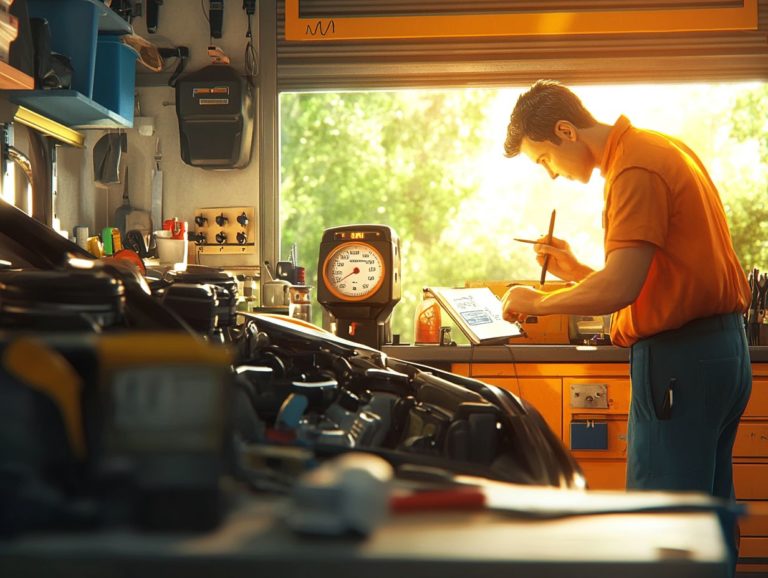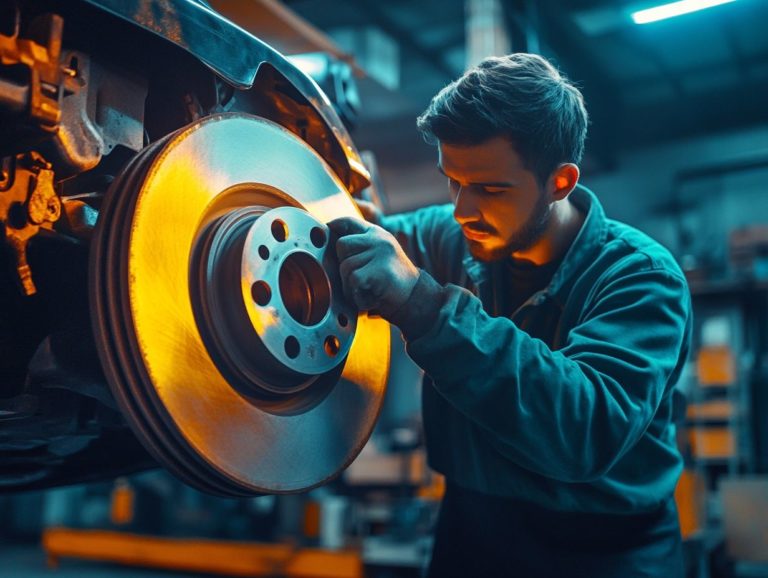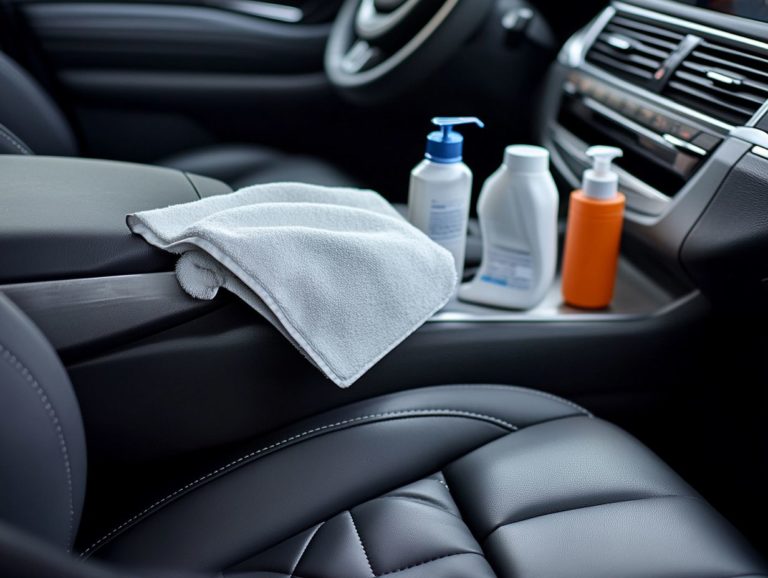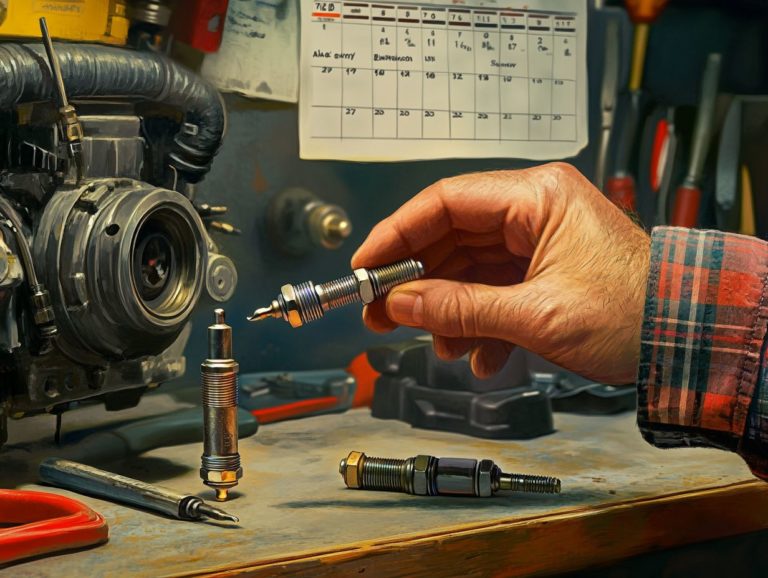The Importance of Cabin Air Filter Maintenance
Your vehicle s cabin air filter is essential for a clean and comfortable driving experience. This often-overlooked component diligently filters out dust, pollen, and pollutants, ensuring that fresh air circulates within your car.
Neglecting its maintenance can lead to various issues, ranging from poor air quality to diminished vehicle performance.
This article delves into the function of the cabin air filter, highlights the signs that indicate it needs replacement, guides you through the replacement process, and offers tips for extending its lifespan.
Maintaining your cabin air filter in peak condition not only enhances your comfort but also elevates your vehicle s overall efficiency.
Contents
- Key Takeaways:
- What is a Cabin Air Filter?
- Why Regular Maintenance is Important
- Signs That Your Cabin Air Filter Needs to Be Replaced
- How to Replace a Cabin Air Filter
- Benefits of Proper Cabin Air Filter Maintenance
- Tips for Extending the Life of Your Cabin Air Filter
- Frequently Asked Questions
- What is the importance of cabin air filter maintenance?
- How often should the cabin air filter be replaced?
- What are the signs that indicate a need for cabin air filter replacement?
- Can I clean the cabin air filter instead of replacing it?
- What happens if I don’t maintain my cabin air filter?
- Can I replace the cabin air filter myself?
Key Takeaways:
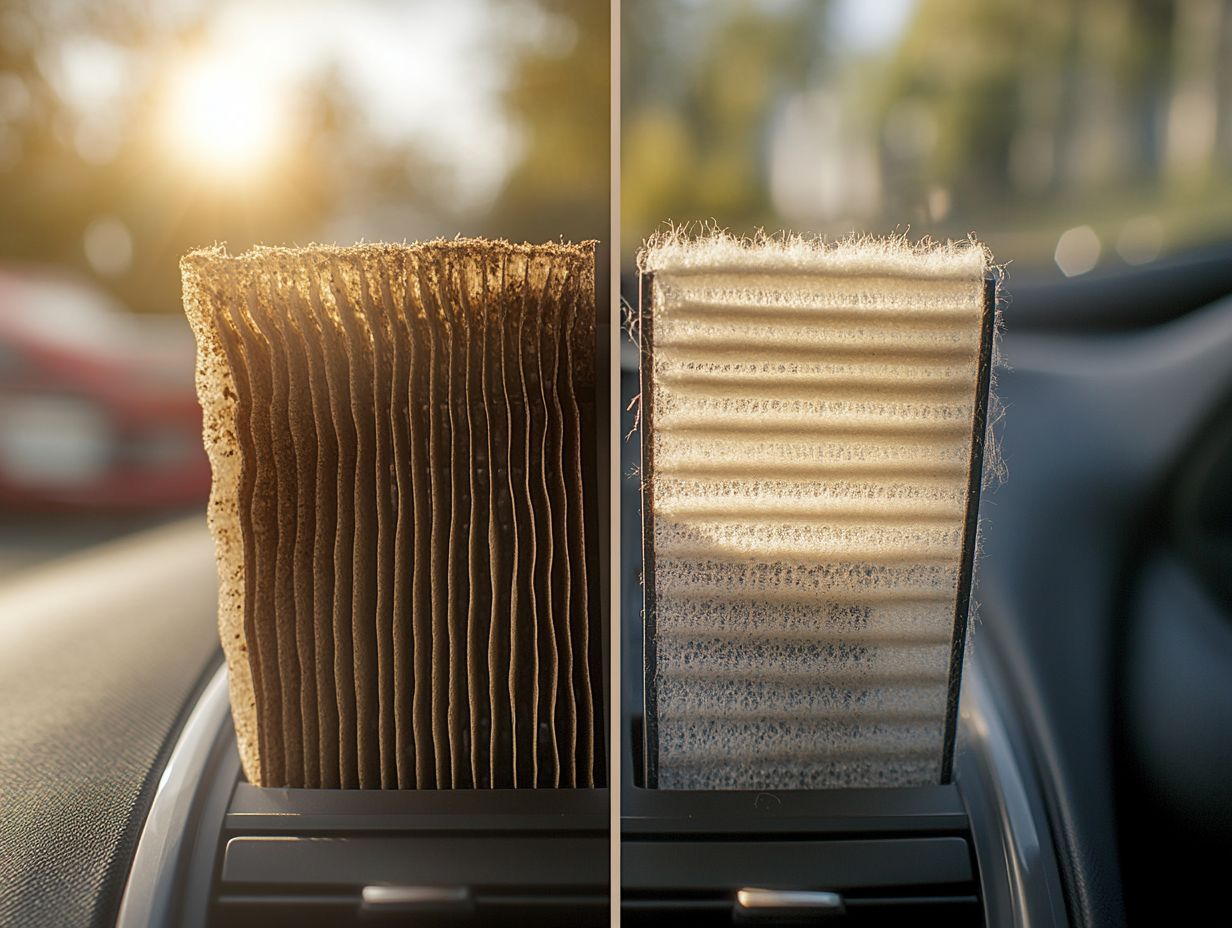
- Regular maintenance of your cabin air filter is crucial for improving air quality and vehicle performance.
- Ignoring cabin air filter maintenance can lead to decreased airflow, foul odors, and potential health hazards.
- Simple techniques, such as regular cleaning and replacement, can extend the life of your cabin air filter and save you money in the long run.
What is a Cabin Air Filter?
A cabin air filter is a critical part of your vehicle s heating, ventilation, and air conditioning system, carefully designed to enhance your indoor air quality. It filters out pollutants, allergens, and other particulates that could compromise your health and comfort while on the road.
This filter does more than just trap dust and pollen; it works hard to keep you healthy and comfortable. It also helps filter out unpleasant smells from outside, significantly improving engine performance by alleviating strain on the air intake system.
Purpose and Function
The primary purpose of your cabin air filter is to capture harmful pollutants, allergens, and particulates, ensuring that only clean air circulates throughout the cabin for a healthier driving experience.
By maintaining high air quality within your vehicle, it significantly enhances your driving comfort, turning every journey into a more enjoyable experience.
You ll likely notice a remarkable improvement in your well-being as the cabin transforms into a sanctuary free from irritants. This allows you to fully concentrate on the road ahead, without the distraction of sneezing or discomfort.
Why Regular Maintenance is Important
Regularly maintaining your vehicle, especially when it comes to air filter upkeep, is essential for a multitude of reasons. It guarantees optimal engine performance and protects the well-being of both drivers and passengers by reducing exposure to harmful allergens and pollutants.
This routine service not only prevents potential engine damage but also creates a more comfortable cabin atmosphere by ensuring proper airflow.
Effects of Neglected Maintenance
Neglecting the maintenance of your cabin air filter can set off a chain reaction of issues that could affect your driving experience. You might find yourself dealing with decreased air quality and potential health risks from allergens, all while risking engine damage due to a clogged filter.
These complications can accumulate over time, potentially leading to chronic respiratory problems for anyone in the vehicle, especially those with asthma or allergies. A clogged filter doesn t just compromise your comfort; it also hampers the effectiveness of your vehicle’s heating and cooling systems.
Plus, it can reduce fuel efficiency, which is how far you can drive on a gallon of gas, forcing your engine to work harder to maintain proper airflow. This inefficiency translates to more frequent trips to the gas station, which means increased costs and mounting frustration for those who overlook this crucial maintenance task.
Don’t ignore your cabin air filter! Regular maintenance, including regular filter changes, is necessary to keep you and your passengers safe.
Signs That Your Cabin Air Filter Needs to Be Replaced
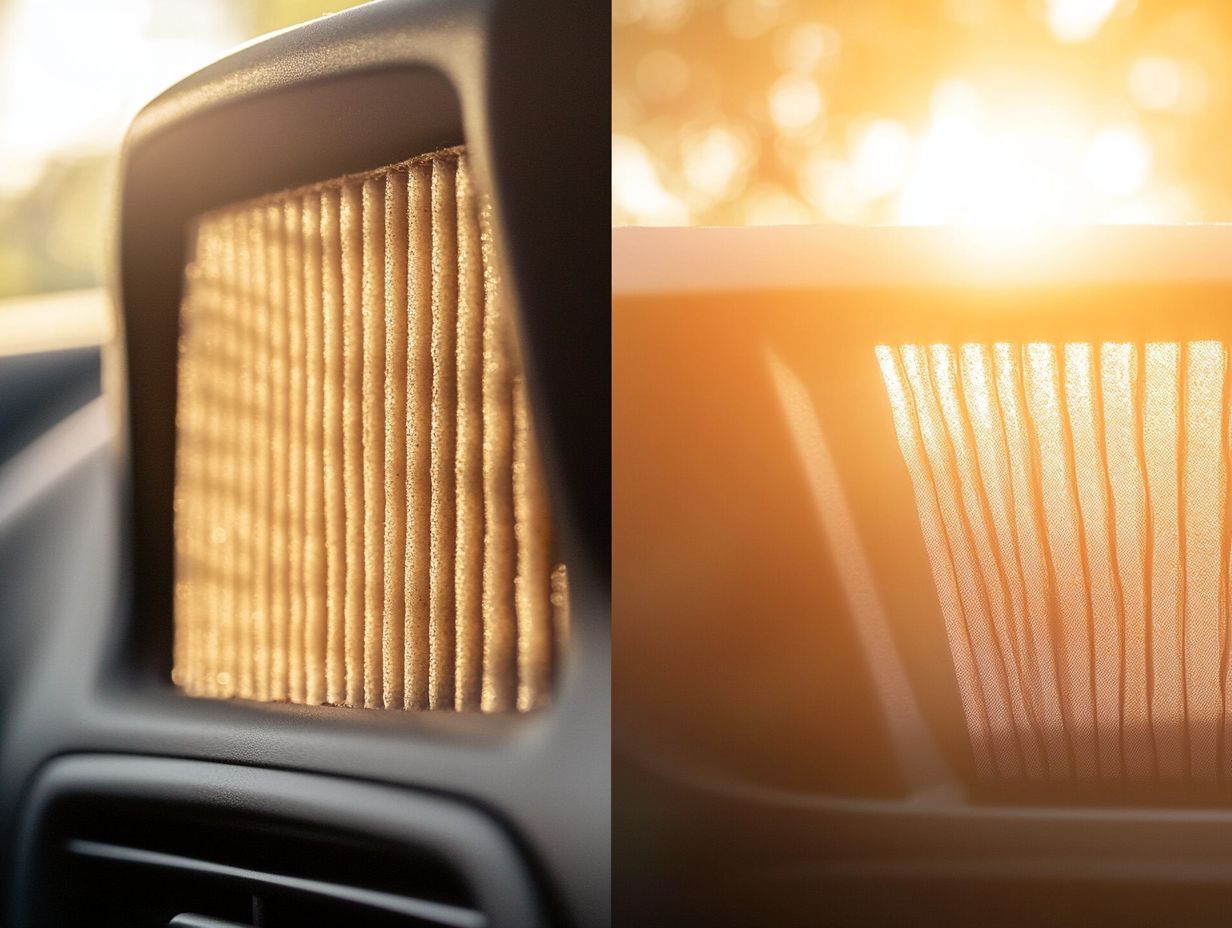
Recognizing the signs that your cabin air filter needs replacing is crucial for maintaining optimal air quality and ensuring a comfortable driving experience.
Common indicators to watch for include reduced airflow, unusual odors, and higher levels of allergens and pollutants within the cabin. Being attentive to these signs can significantly enhance the overall atmosphere in your vehicle, allowing you to drive with confidence and comfort.
Common Indicators
Common indicators that your cabin air filter may need replacing include visible dirt and unpleasant odors wafting from the air conditioning system. You might also notice a noticeable drop in airflow inside your vehicle.
These signs suggest that the filter is becoming overloaded with dirt and dust, potentially diminishing your vehicle’s performance and compromising your health. A clogged cabin air filter hinders the effectiveness of your heating, ventilation, and air conditioning (HVAC) system. This makes it more challenging to maintain a comfortable temperature.
If allergens or pollutants accumulate in the filter, they may worsen health issues for sensitive individuals, such as those with asthma or allergies. Regularly checking and replacing the cabin air filter ensures that the air circulating within your vehicle remains clean and fresh, ultimately enhancing your overall driving comfort and safety.
How to Replace a Cabin Air Filter
Replacing a cabin air filter is a simple yet impactful maintenance task that can significantly improve air quality and enhance your driving comfort. It typically involves an easy step-by-step process that you can follow for proper installation and optimal functionality.
Step-by-Step Guide
To replace a cabin air filter, start by locating the filter compartment, usually behind the glove box or under the dash. Follow this systematic approach to ensure a flawless installation.
- Gather your tools: You ll need a screwdriver, pliers, and perhaps a small flashlight to illuminate your workspace.
- Access the compartment and carefully remove any screws or clips holding it in place. Keep them in a safe spot.
- Gently pull out the old filter, being cautious of any debris that may have accumulated.
- Before proceeding, inspect the new cabin air filter. Ensure it s designed to fit your vehicle model for optimal airflow.
- When you re ready to replace it, take note of the airflow direction indicated on the filter.
- After securing the new filter, reassemble the compartment, double-checking that everything is snug to prevent any rattling while you drive.
Regularly replacing the cabin air filter not only promotes cleaner air but also enhances the overall efficiency of your vehicle s ventilation system.
Benefits of Proper Cabin Air Filter Maintenance
Maintaining your cabin air filter brings a wealth of benefits. You’ll enjoy improved air quality and enhanced vehicle performance, all while significantly boosting the health of everyone inside.
By minimizing exposure to allergens and pollutants, you create a more comfortable and inviting cabin experience for yourself and your passengers. Don’t wait for symptoms to appear; act now for better air quality.
Improved Air Quality and Performance
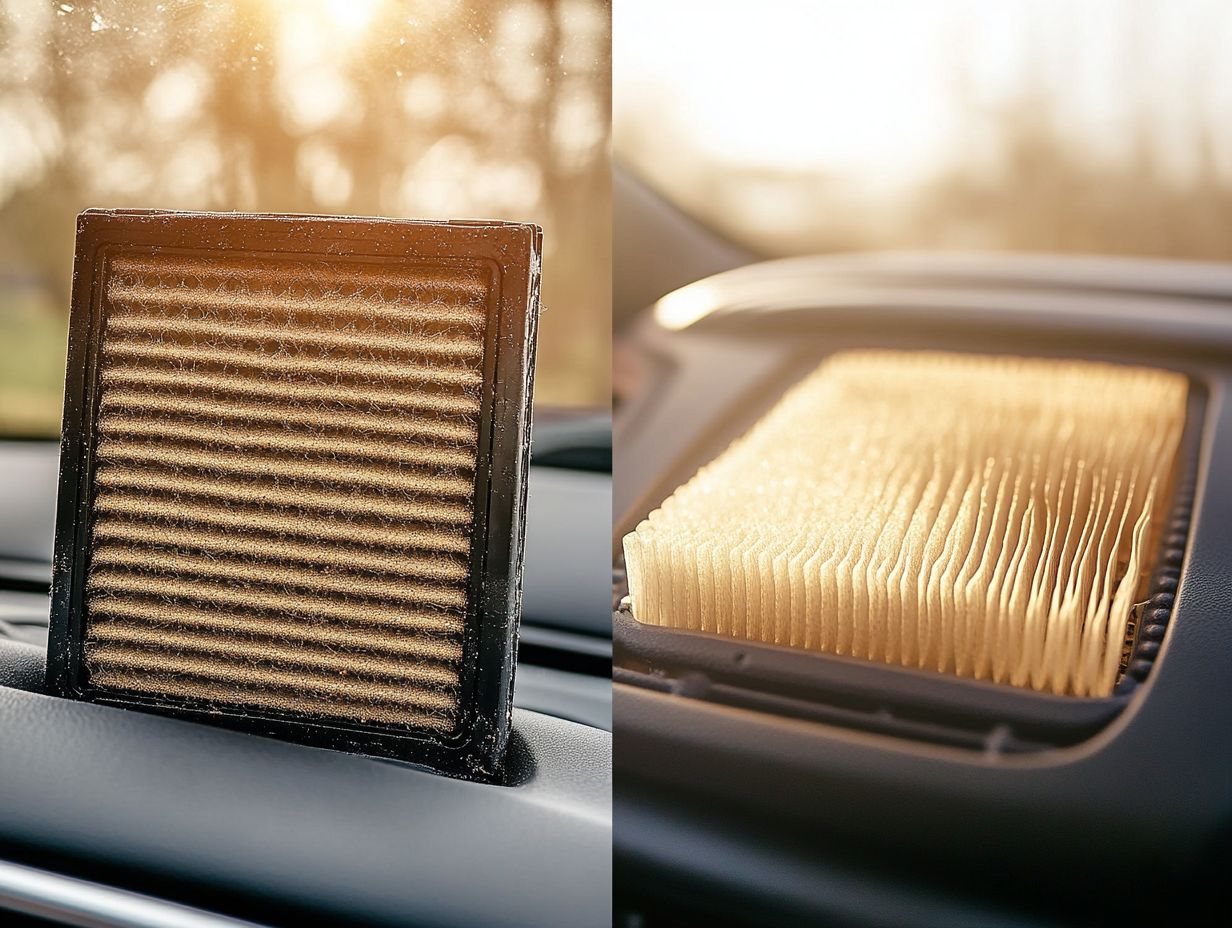
One of the most significant advantages of maintaining your cabin air filter is the enhanced air quality it provides. This improvement elevates your driving experience and bolsters the overall health of everyone in the vehicle by filtering out harmful allergens and pollutants.
When the air inside your vehicle is clean and free from irritants, you’ll notice fewer instances of respiratory issues, allergies, and even fatigue during your travels. A better cabin atmosphere often translates to a smoother-running vehicle, as engines operate more efficiently when they aren t struggling against clogged filters and debris.
This combination fosters a healthier environment for all passengers while ensuring that your vehicle performs at its peak. This ultimately extends its lifespan and improves fuel efficiency, giving you peace of mind on the road. Take the first step towards a healthier drive today!
Tips for Extending the Life of Your Cabin Air Filter
To extend the life of your cabin air filter, implement effective maintenance techniques and conduct regular checks tailored to your driving conditions. This approach ensures consistently clean air and best performance for your vehicle.
Simple Maintenance Techniques
Employing simple maintenance techniques for your cabin air filter is essential for best vehicle performance. Regular inspections and timely cleaning will serve you well.
Follow replacement schedules based on your driving conditions and service provider recommendations. By routinely checking the filter, you can catch any buildup of dirt and debris that might impair its efficiency especially if you drive in areas with heavy pollen or dust.
Cleaning the filter not only enhances its functionality but also significantly extends its lifespan, making it a worthwhile investment.
Always refer to your vehicle’s manual to ascertain the recommended replacement intervals. This ensures you maintain the best air quality during your journeys.
Seasonal changes impact filter performance, so adjust your maintenance routine accordingly to sustain a fresh and comfortable cabin environment year-round.
Frequently Asked Questions
-
What is the importance of cabin air filter maintenance?
The cabin air filter ensures clean and fresh air inside the car by filtering out dust, pollen, and other contaminants. Proper maintenance, including regular oil filters, is crucial for maintaining good air quality and preventing potential health issues.
-
How often should the cabin air filter be replaced?
Make sure to replace your cabin air filter regularly for the best air quality! It is generally recommended to replace it every 12,000 to 15,000 miles, or once a year. However, if you frequently drive in dusty or polluted areas, you might need to replace it more often.
-
What are the signs that indicate a need for cabin air filter replacement?
A musty or moldy odor, reduced airflow from the vents, and increased dust and debris inside the car are all signs that the cabin air filter needs to be replaced. These issues can also be caused by a dirty or clogged filter.
-
Can I clean the cabin air filter instead of replacing it?
No, the cabin air filter is not designed to be cleaned and reused. It is a disposable filter that should be replaced when it becomes dirty or clogged. Attempting to clean it can damage the filter and affect its effectiveness.
-
What happens if I don’t maintain my cabin air filter?
Failure to maintain the cabin air filter can result in poor air quality inside the car, leading to health issues such as allergies and respiratory problems. It can also strain the HVAC system (heating, ventilation, and air conditioning) and reduce its overall efficiency.
-
Can I replace the cabin air filter myself?
Yes, replacing the cabin air filter is a relatively simple task that can be done at home with the right tools and instructions. However, if you are not confident in doing it yourself, it is best to have a professional handle the replacement for you.
Don’t wait until it’s too late! Check your cabin air filter immediately to enjoy clean air today! We welcome your feedback or any questions you may have about cabin air filter maintenance.



